- Home
- Ian McDonald
River Of Gods Page 29
River Of Gods Read online
Page 29
In the next bungalow was a family of civil servants from Bangalore, below the salt in every way, but Shaheen Badoor saw their boy and girl play on the outrigger, jump into the clear water and surface, gasping, dewed with drops, laughing and laughing and laughing to do it all again. A seed of emptiness was planted there, that germinated on the long train journey back up the length of India into an ache, a hope, a desire that had no name or words, but smelled like sunburn lotion, itched like sand between the toes, felt like warm coconut matting, sounded like children cries coming across water.
Shaheen Badoor Khan whirls to a stop. He fights immense, racking sobs heaving up inside him. He wanted it so much but his was not the life that could ever have that kind of freedom. He would give anything to be that beautiful, even for one day.
Feet. Outside. Bare feet. Shaheen Badoor Khan shakes free of the succubus.
‘Who’s there?’
‘Sir ? Are you all right?’
‘I’m fine. Leave me, please.’
Everything is fine, as fine it can be amidst ruins. Shaheen Badoor Khan straightens his suit, smoothes out the rucked up dhuri where he whirled, and God honoured him. He was taken down into the nafs, the desiring core of the soul, and there shown the true nature of the God-within and his cry for aid beyond comprehension was answered.
He knows what he must do now about the nute.
TAL
For the rest of the week Tal throws ytself into yts work, but not even the interiors for the haveli into which Aparna Chawla and Ajay Nadiadwala will move after their virtual wedding can quell the demons. A gendered. A man. A Khan. Tal tries to shake the image from yts brain but he’s strung out along the neurons like Diwali lights. That’s the ultimate fear: it’s all unravelling in there, all those biochips and hormone pumps dissolving into yts bloodstream. Tal fears yt’s pissing yts nuteness away through yts kidneys. Yt can still taste this Khan’s lips.
By the end of the week even Neeta is telling yt yt should take time off.
‘Get, go on, out of here,’ Line Producer Devgan orders. Tal gets, goes, out-of-heres to Patna. No one but a nute would think of weekending in that sprawling, hot, soul- free industrial city. There’s someone Tal needs to see there. Yts guru.
Two hours later Tal is down at the river, blinking polarised contact lenses against the brilliants glinting from the water and booking a first return (it is better to travel first class than to arrive, baba) on the fast hydrofoil to Patna. Thirty minutes later yt’s curling back into yts seat, closing yts eyes and small, soft fists in pleasure to the opening beats of GURU GRANTH MIX as the industrial plants slip by on the far dry banks. Yt’s amazed there’s enough water to float this thing.
There’s a new look on Patna’s pollution-soaked streets. Dark and flowing is in. As is hair, worn in a single off-centre moheek, flopped over the forehead. And nobody would be seen dead in ski-goggles. Nothing Tal can do about the hair but ClimBunni on Amrit Marg has all the look, racked up and ready to vend. Tops here, bottoms there, unders here, footwear in back. The card takes another weighty blow but half an hour later Tal swings out on to the streets in swathes of soft grey silk and silver-black cow-nute boots with five centimetre heels and the essential bead tassles swaying from the bootstraps. The guys are reeling, the girls are watching enviously, the women in the coffee-shops are leaning together and talking behind their hands, the traffic-cop on point-duty at the roundabout almost spins three sixty as Tal clicks yts contact lenses black against the sun and it’s good, so good, so astonishingly unexpected and wonderful and hilarious to be back on Patna streets under Patna sun breathing Patna smog, threading through the Patna bodies and faces, moving to the Patna mix in yts phones. Everything dances to the mix. Everything is a musical, every chance encounter between passersby is murder or an adultery or a robbery or long-lost lovers reuniting. The clothes are brighter and the signs are flashier and everything is about to break into one huge production number, city-wide, just for Tal. Yt prays to Ardhanarisvara god of nutes to let yt be the first to bring the noo look back to Varanasi.
Varanasi. And men called Khan. And everything.
For those who know, there is the fast boat down beneath the glass towers of the Commercial Bund that will take you up to the sangam where the guru conducts yts operations. The boat is a mahogany Riva, Tal notes with approval. Twin engines stand the Riva on its tail and take it out past the scuttling little ferries and barge trains. The boat cuts across the main channel and veers left towards the great sand spit where the Gandak joins the sacred Ganga. On and around this wide sand delta stands Bharat’s biggest, cheapest, dirtiest and least regulated free-trade zone. The pressed aluminium larri-gallas and go-downs long ago crowded each other off the available land on to the water: the sangam is fringed by decommissioned lighters twenty deep. Families live here that boast they never set foot on dry land; all they need for birth, for life, for death, they can find running over the maze of gangplanks and companionways, boat to boat.
The Riva takes Tal through ever-narrowing channels between steel hulls painted with improving Hindu texts until it squeezes into a conduit barely wide enough to contain it to pull in beside an old tug with the unlikely name of Fugazi. For thirty years she hauled bulk cargo upstream from Kolkata to Patna’s new industries. Then White Eagle Holdings bought her up, sailed in to final dock on the Gangak Free Trade Zone and eviscerated her engines. White Eagle Holdings is a deeply respectable fund management company based in Omaha, Nebraska, specialising in pension plans for healthcare workers. It owns several floating factories in Patna that specialise in those medical services the Bible-believing voters of the mid-West vehemently deny their fellow-countrymen. Hundreds of high-revenue, low-legality industries have their corporate headquarters in Gangak Eff Tee Zee: custom-pirate radio stations, pharm phakers, fileshare services, datahavens, emotic breweries, genebusters, clonelabs, cell therapists, Darwinware jungles, copy protection strippers, forex shuttle services, label rippers, stem-cell farmers, pornocrats, at least one Gen 3 aeai (mooted) and Nanak the kind doctor, the good nute, the guru of the sweet knives.
Tal climbs the steel ladder, nervously conscious of the looming metal wall of the neighbouring barge at yts back. One eddy in the mingling of waters around this point and the closing walls of steel would burst yt like a dropped egg. A face peeps over the rail: it is Nanak, the good doctor, disreputable as always in a pair of cargo shorts three times too big, a clingy mesh top and big tank-girlie boots, grinning like a holy monkey.
They embrace. They touch. They kiss. They stroke emotions of joy and presents and childhood stay-up-lates and the first bread of the morning and glissandos of baroque into their sub-dermals, those same neural keys Nanak’s robot surgeons fused into the nerve fibres of Tal’s flayed body. Then they break and smile and make silly, joyous noises and are happy all over again.
‘The style got you, I see,’ Nanak says. Yt’s small and a little shy and coy, and bowed a little lower by gravity but yt’s still got the kindest smile. Yts skin is ochre from the sun.
‘At least I make an effort,’ Tal says, inclining yts head at Nanak’s dock-wallah gear.
‘You just watch your heels around here,’ Nanak warns. The deck is a fashion assault course of cable ducts and hatch dogs and pipes any of which could send the careless nute crashing against hard steel plate. ‘You will stay for tea, won’t you? Careful here.’ They scale a steep ladder to the wheelhouse. One step before the top Tal pauses to look out over the city of boats. It is as busy as any bazaar. Beyond making money, there is always work to be done on any ship: painters and deck-swabbers, gardeners, water-engineers, solar power experts, com riggers. Music booms, bass amplified by the copious hollow metal.
‘So, what is it?’ Nanak asks as yt shows Tal into the wood-panelled, cedar-scented reception room. The smell evokes as powerful an emotional reaction in Tal as any neural keyed response. Yt is back in the wood-lined womb. Yt remembers how the leather sofas creak, how Suniti on the desk hums filmi hits when
she thinks no one else is around.
‘Just a routine check up,’ Tal says.
‘Well, we’ll certainly do that for you,’ Nanak says and calls the elevator to go down into the empty heart of the ship where yt carries out yts transformations.
‘You busy?’ Tal asks to hide yts apprehension. The elevator opens on to a corridor of mahogany and brass doors. Tal spent a month behind one of them, crazy on painkillers and immunosuppressives as yts body came to terms with what the robot surgeons had done to it. The real insanity had come when the protein chips wired into yts medulla unpacked and started overwriting four million years of biological imperative.
‘I’ve two in,’ Nanak says. ‘One waiting - cute little Malay, really nervy, could bolt at any time, which would be a shame - and one in post-op. We seem to be picking up a lot of old-style transgenders so our reputation is spreading outside the scene but I’m not that keen on it. It’s just butchery. No finesse at all.’
And they will pay for it, as Tal pays for it still; ten per cent down and monthly repayments for most of the rest of yts life. Full body mortgage.
‘Tal,’ Nanak says gently. ‘Not that one, in here.’ Tal finds yts hand on the door of the surgery. Nanak swings open the clinic door. ‘Just checking you over, cho chweet. You don’t even need to take your clothes off.’
But Tal does kick off yts boots and slips out of yts cool coat before lying back on the white, softly padded table. Yt blinks, self-conscious, up into the lights as Nanak bustles about recalibrating the scanner. This is when Tal remembers that Nanak, the sweet doctor, doesn’t even have a nursing qualification. Yts just a broker, a stevedore of surgery. Robots dismembered Tal and put yt back together again, micro-manipulators, molecule-thin scalpels guided by surgeons in Brazil. Nanak’s talent is in bedside manner and a nose for the sharpest medics at the keenest prices wherever the global market opens an opportunity.
‘So, baba, tell Nanak, is this a purely medical call or are you checking out the Patna scene?’ Nanak asks as yt slips a ’hoek behind yts large ear.
‘Nanak, I’m a career nute now, don’t ya know? I’ve moved up to section head in three months. A year from now, I’ll be running the show.’
‘Then you’ll be able to come to me to buy whole new sets of emotics,’ Nanak says. ‘I’ve got some new stuff, fresh from the mixers. Very good. Very strange. Right. Ready. Just breathe normally.’ Yt lifts a hand in a mudra and semi-circles of white metal slide out of the bed base and join in a ring over Tal’s feet. Despite Nanak’s injunction, Tal finds yt’s holding yts breath as the scanner begins its pilgrimage up yts body. Yt closes yts eyes as the ring of light sweeps over yts throat and tries not to imagine that other table, beyond that other door. The table that is not a table, but a bed of gel in a tank of robots. Yt was lain on that table, anaesthetised to within a glimmer of death, autonomic responses wired to a medical aeai that kept yts lungs pumping, heart beating, blood circulating. Tal cannot remember the top of the tank descending, locking in place, filling with more pressurised, anaesthetic gel. But yt can imagine and imagination has become memory, a claustrophobic imaginary memory of drowning. What yt cannot - dares not - imagine are the robots moving through the gel, blades extended, to flay every centimetre of skin from yts body.
That was the first part.
As the old skin was incinerated and the new one that had been seeded three months before from a sample of Tal’s DNA and a egg sold by some basti woman grew ripe in its tank, the machines went in. They moved slowly through the viscous, organic gel, driving in under the muscle armouring, peeling back fat, detouring around blood lines and engorged arterials, disconnecting sinews to get to the bone. In their Sao Paulo offices, the cheap surgeons operated on air with their manipulator gloves and opened up intimate, bloody vistas of Tal’s body on their visors. Osteobots sculpted bone, reshaping a cheek here, widening a pelvis, shaving slivers from shoulder blades, dislocating, relocating, amputating, substituting plastic and titanium. As they worked, teams of GUMbots removed all genitalia, replumbed ureter and urethra, and respliced the hormone triggers and neural response pathways to the array of sub- dermal studs embedded in the left forearm.
Tal hears Nanak laugh. ‘I can see right inside you,’ yt giggles.
Three days in that tank Tal hung; skinless, bleeding constantly, a whole body stigmata, while the machines worked slowly, steadily, shift after shift dismantling yts body and rebuilding. Then their task was done and they withdrew and the neurobots went in. Different doctors guided these, a team from Kuala Lumpur. In the three days of Tal’s passion, the market had shifted in neurosurgery. This was a different, more refined science than cutting and pasting gobbets of meat. Clicking crab-bots fused protein circuitry to nerve fibre, spliced nerves to gland inducers, rewired Tal’s entire endocrine system. While they grafted, big machines took the top off Tal’s skull and micro-manipulators crept between the tangled ganglia like hunters in a mangrove swamp to spot-weld protein processors to neural clusters in the medulla and amygdala, the deep dark root-buttresses of the self. Then, on the morning of the fourth day, they brought Tal back from the edge of death and woke yt up. The aeai hooked into the back of Tal’s skull now had to run a full autonomic nervous system test that the chip grafts had seated correctly and that the neural firing patterns yt had previously associated with gender would trigger the new, implanted behaviours. Skinless, muscles hanging like sacks from disconnected sinews, eyeballs and brain naked to dermal trauma gel, Tal woke up.
‘Nearly done, baba,’ Nanak says. ‘You can open your eyes, you know.’
Only that cocoon of anaesthetic gel kept Tal from dying of pain. The aeai played yts neural network like a sitar. Tal imagined fingers moving, legs running, felt urgings and stirrings where yt never had before, saw visions and wonders, heard choruses and God whistling, was sucked down by washes of sensation and emotion yt had never know before, hallucinated monster striped buzzing insects filling yts mouth like a gag, then, in the same instant, dwindling to the size of a pea, revisited places yt had never been, re-greeted friends yt had never known, remembered lives yt had never lived, tried to cry out yts mother’s name, yts father’s name, God’s name, screamed and screamed but yts body had been shut down, mouthless, helpless. Then the aeai shut Tal’s brain down again and in the amnesia of anaesthesia yt forgot all the wonders and horrors yt had met in the tank of gel. The helpful machines put the top back on yts head, reconnected everything that had been disconnected and draped Tal in yts new skin fresh from the stem cell vat. Five days more yt hung, merely unconscious, in a wash of cell stimulant medium, dreaming the most astonishing dreams. On the tenth morning the aeai disconnected from Tal’s skull, drained the tank and washed down yts sleek new skin as yt lay there, complete, new, on the transparent plastic, shallow chest rising and falling in the white spotlights.
‘Well, that’s you,’ Nanak says and Tal opens yts eyes to see the scanner ring split in two and retract inside the diagnostic bed.
‘Am I?’
‘Apart from time’s usual depredations, you look lovely inside. Full of light. Otherwise, the usual homily about saturated fats, alcohol, tobacco, non-prescription drugs and moderate exercise.’
‘What about . . .’ Tal raises a hand to yts head.
‘Not a damn thing wrong with you. I issue you a complete bill of health. Isn’t that good? Now, get up and have dinner with me and tell me what this is all about.’
Swinging over the side of the diagnostic bed, Tal tries out a dozen excuses to turn down the invitation and then realises that if yt doesn’t tell Nanak what’s in yts heart, then the entire trip to Patna will have been folly.
‘Right then,’ yt says. ‘I accept.’
Dinner is simple, exquisite vegetarian thalis taken on the flying bridge from which captains once overviewed their flotillas of barges. Nanak’s assistant and cook Suniti flits in and out with bottles of cold Kingfisher and advice on how each dish should be eaten, ‘a mouthful, and hold it until your tongu
e goes numb’, ‘two bites’, ‘a spoon of this, a bite of that, then the lime.’ Gandak FTZ winds down after its day earning dividends for the medical professionals of Nebraska. Music and the smell of ganja coil up from the barges where entrepreneurs emerge from their workshops to lean on the rails and smoke and crack beer in the last of the sun.
‘So, now you must pay me,’ Nanak says and when yt sees the consternation on Tal’s face, yt touches it lightly, reassuringly. ‘No no. Suniti will take care of that. You must pay me what you owe me for this excellent food and fine evening and my exquisite company, with what you have kept from me all day, bad baba.’
Tal rolls on to yts back on the soft tatami mat. Above yt, the sky is barred with straps of purple cloud, the first yt has seen in months. Yt imagines yt can smell rain, so long anticipated, an imagination of a memory.
‘It’s someone, but you knew that anyway.’
‘I had an idea.’
A lone bansuri throws notes out in the softening dark. A musician, down there amongst the badmashes, coiling out an ancient Bihari folk tune.

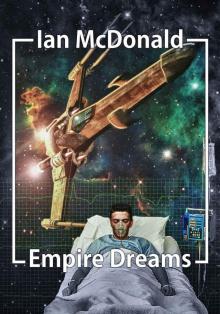 Empire Dreams
Empire Dreams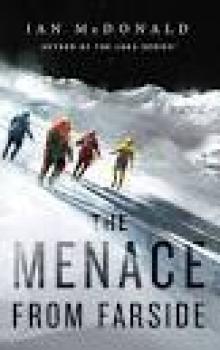 The Menace from Farside
The Menace from Farside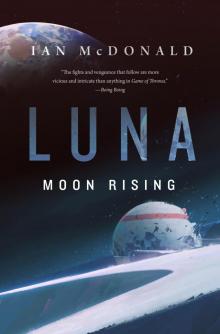 Luna: Moon Rising
Luna: Moon Rising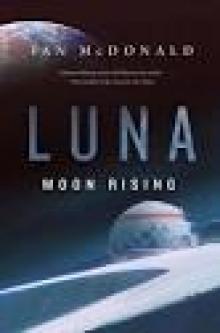 Moon Rising
Moon Rising Desolation Road dru-1
Desolation Road dru-1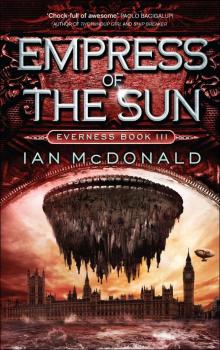 Empress of the Sun
Empress of the Sun Ares Express dru-2
Ares Express dru-2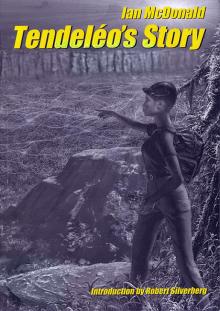 Tendeléo’s Story
Tendeléo’s Story River Of Gods
River Of Gods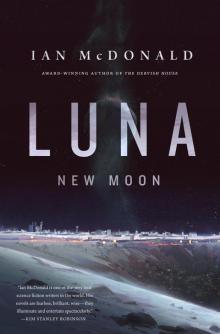 Luna
Luna![Cyberabad Days - [River of Gods 02] Read online](http://i1.bookreadfree.com/i1/03/29/cyberabad_days_-_river_of_gods_02_preview.jpg) Cyberabad Days - [River of Gods 02]
Cyberabad Days - [River of Gods 02]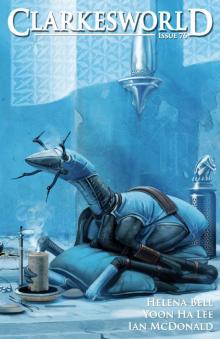 Clarkesworld Magazine Issue 76
Clarkesworld Magazine Issue 76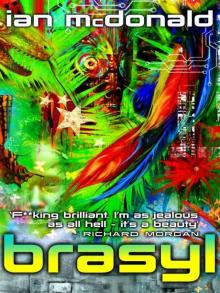 Brasyl (GollanczF.)
Brasyl (GollanczF.)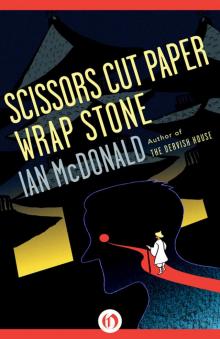 Scissors Cut Paper Wrap Stone
Scissors Cut Paper Wrap Stone Chaga
Chaga Time Was
Time Was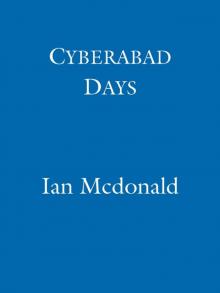 Cyberabad Days
Cyberabad Days Be My Enemy
Be My Enemy Changa
Changa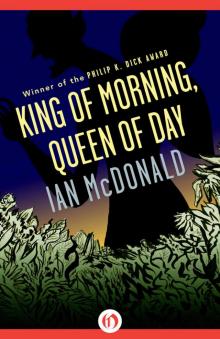 King of Morning, Queen of Day
King of Morning, Queen of Day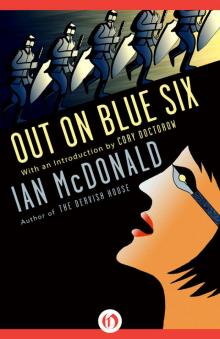 Out on Blue Six
Out on Blue Six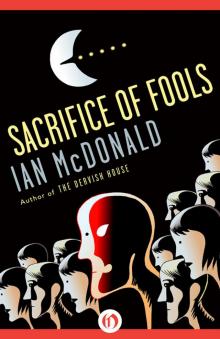 Sacrifice of Fools
Sacrifice of Fools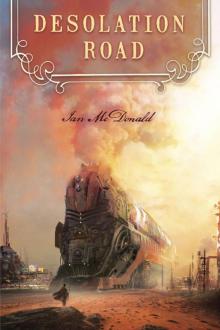 Desolation Road
Desolation Road Luna--Wolf Moon--A Novel
Luna--Wolf Moon--A Novel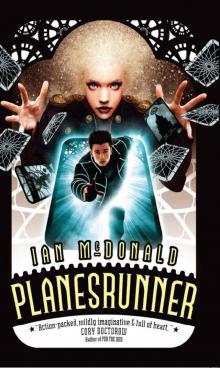 Planesrunner (Everness Book One)
Planesrunner (Everness Book One) Ares Express
Ares Express